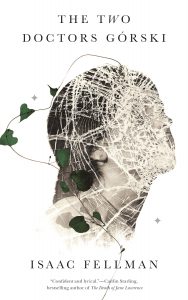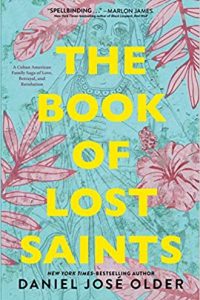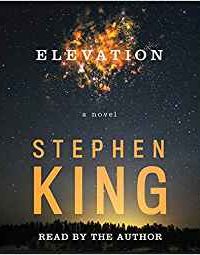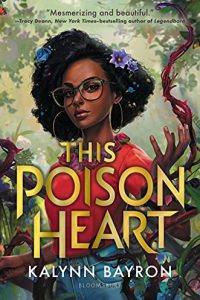Jake Casella Brookins Reviews The Two Doctors Górski by Isaac Fellman
 The Two Doctors Górski, Isaac Fellman (Tordotcom 978-1-25084-093-6, $16.99, 176pp, tp) November 2022.
The Two Doctors Górski, Isaac Fellman (Tordotcom 978-1-25084-093-6, $16.99, 176pp, tp) November 2022.
It’s trite but true to say that reading is a kind of magic. Likewise, that it’s a kind of mind reading, and that writing characters is a fraught kind of creation. Isaac Fellman’s debut novella is a sharply-focused picture of the dangers these kinds of magic: an acerbic and atmospheric tale of power abused and survived.
The Two Doctors Górski follows Annae Hofstader, a young researcher of clinical magic who has fled personal and professional disaster in America, traveling to England to study under the slightly infamous Marec Górski – one of the two eponymous doctors; the other is his estranged homunculus, Ariel. When Marec proves both a hostile mentor and a mystic threat to those around him, and with Annae’s own magic use becoming problematic, she seeks out Ariel – a doctor of psychology, not magic – for advice.
The novella is a fine addition to the more supernatural kind of ‘‘dark academia,’’ such as Lee Mandelo’s Summer Sons or Marina & Sergey Dyachenko’s Vita Nostra. Where magic schools often have a certain air of the humanities about them – books tending to be written by writers, it’s an understandable bias – the particular grad-student stress in The Two Doctors Górski has a distinctly STEM flavor that underscores the practical nature of the occult in this world. The scope and possibilities of magic are thoroughly naturalized, never entirely spelled out, though it has something of the scientific tone of alchemy and spiritualism – there’s a thread of faintly luminescent body-horror at play that never quite says ‘‘ectoplasm’’ out loud. But magic, here, except for the occasional glamourous flash like Marec’s Ariel, is an accepted if esoteric field, one developed in stressful but utilitarian labs, mildly debated at lanyard-swinging professional conferences.
The fantastic elements of The Two Doctors Górski are hardly incidental – they’re compelling in their own right, with some striking magical scenes – but they pale in comparison to the writing itself. Not surprising, after the reverberant The Breath of the Sun and the intimate and meditative Dead Collections – Fellman continues to showcase a skill for capturing psychological depths with flashing concision, like a portrait photographer somehow fixing an entire personality in a micro-expression. Neither flowery nor bombastic, The Two Doctors Górski is studded with tart and revelatory turns of phrase that carve out the kind of imagistic and ideational depth usually only found in longer works. Like its protagonist, there’s something compact, clever, and wounded about the writing here: its best lines all land like retorts, as though the world had insulted it first.
Like R.F. Kuang’s Babel, or the Necessity of Violence, another excellent recent bit of dark academia, this story is also consciously engaged in thinking about imperialism and the fantasies it tells about itself, how they ramify down to the personal level. Here, it’s framed in the way that Annae approached the idea of an English university through a glamorizing lens of English literature: Tolkien, Lewis, Le Carré, and more. Ariel, who is, thankfully, a wonderful character, despite literally being a man Marec invented to get mad about, is quick to diagnose it as just ‘‘how empire works… It puts out this mythology that it’s the only really safe thing.’’
It’s the Lewis allusion that most resonated with me, though less the jumbled evangelism of Narnia and more the austere and cerebral Space Trilogy, peppered as it with occult and psychological horror. What Fellman catches, made all the more terrible for its secularity, is how both the divine and the diabolical vacillate between an awful indifference and an awful fixation. Marec and Jonathan (Annae’s manipulative ex) are hideously accurate portrayals of institutional abusers, and the novella fixes, as in a laboratory slide, how that abuse stems from both profound arrogance and distressingly predatory focus. They care far too much about their victims, or not at all.
We get to see these and other characters the more closely due to Annae’s penchant for, perhaps addiction to, mind-reading. Sometimes this is obviously if understandably self-destructive, like looking up your own name on social media: ‘‘It was impossible to resist the urge to know someone who might think ill of her.’’ More subtly, it feels like a meditation on – perhaps a condemnation of – the way binge-watching, or reading, is a kind of self-negation: ‘‘when she was inside someone else’s mind, she didn’t feel the world biting into her.’’
Here and elsewhere in The Two Doctors Górski, there’s an explicit desire to disappear. Beyond that, there’s the idea of homunculi as a means of self-improvement – splitting off your personas, keeping only what you want to acknowledge, a feat that is both magically impressive and almost always cursed. This is a dark novella, and feels like a new direction in Fellman’s already-impressive use of the speculative to think through questions of identity. At the end of an unusual and emotionally effective plot, Annae remains: visible, sensible, and so far, despite everything, still one person.
Jake Casella Brookins is from the Pennsylvania Appalachians, and spent a fantastic amount of time in the woods. He studied biology, before switching over to philosophy & literature, at Mansfield University. He’s been a specialty coffee professional since 2006. He’s worn a lot of coffee hats. He worked in Upstate New York and Ontario for about 8 years. He’s been in Chicago since 2013; prior to the pandemic, he worked for Intelligentsia Coffee in the Loop. Starting in 2021, he’s been selling books at a local indie bookstore. He lives with his wife, Alison, and their dogs Tiptree & Jo, in Logan Square.
This review and more like it in the November 2022 issue of Locus.
 While you are here, please take a moment to support Locus with a one-time or recurring donation. We rely on reader donations to keep the magazine and site going, and would like to keep the site paywall free, but WE NEED YOUR FINANCIAL SUPPORT to continue quality coverage of the science fiction and fantasy field.
While you are here, please take a moment to support Locus with a one-time or recurring donation. We rely on reader donations to keep the magazine and site going, and would like to keep the site paywall free, but WE NEED YOUR FINANCIAL SUPPORT to continue quality coverage of the science fiction and fantasy field.
©Locus Magazine. Copyrighted material may not be republished without permission of LSFF.








